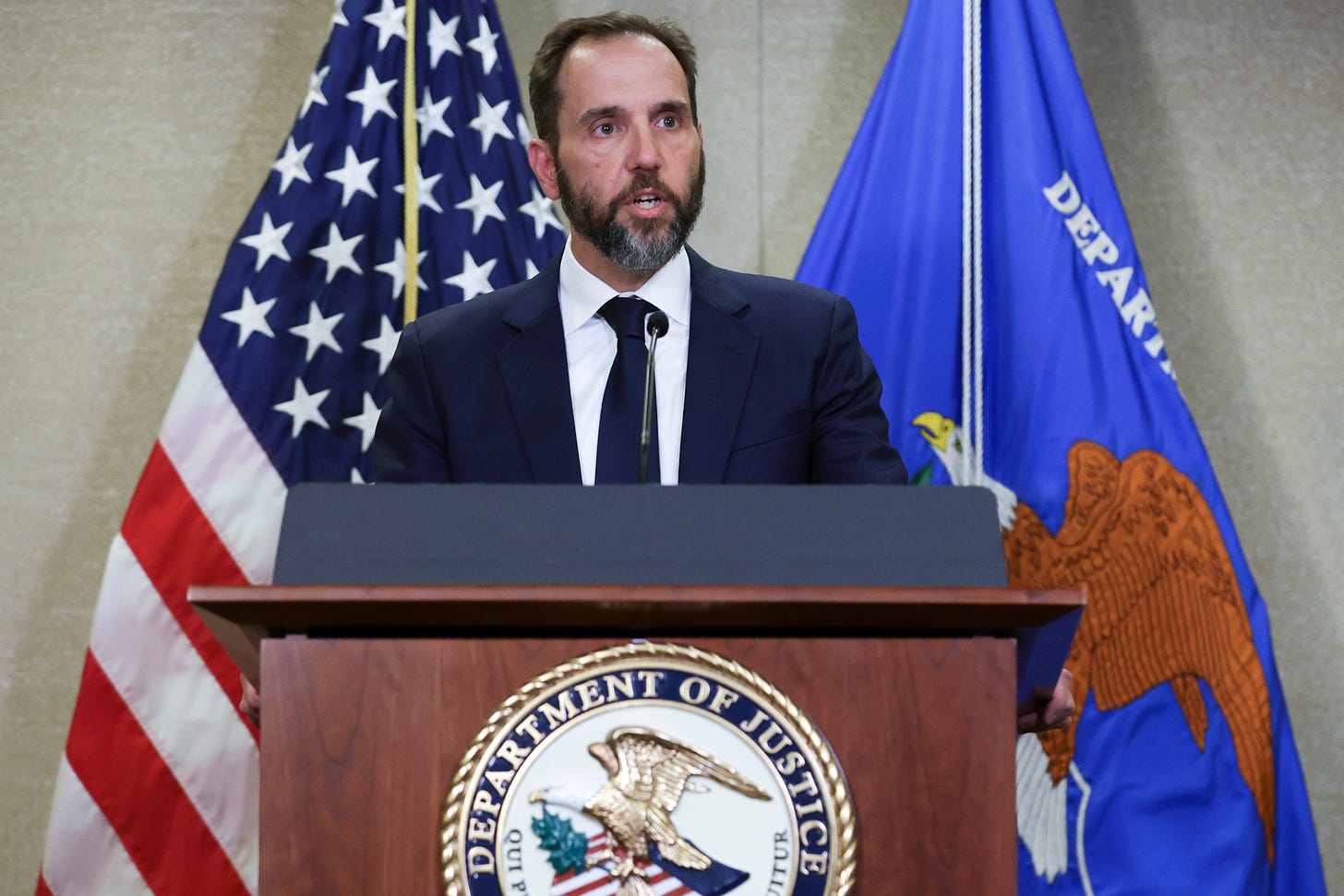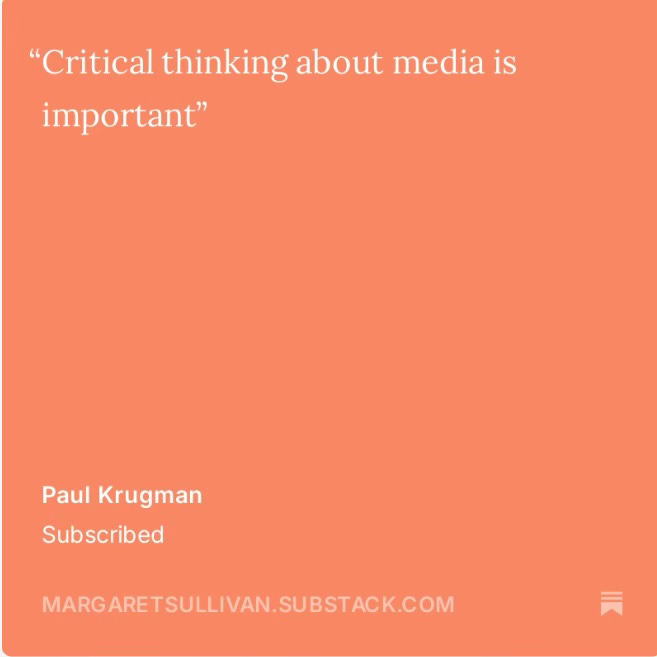Jack Smith's explosive brief should have landed like an asteroid. (It didn't.)
Plus a really bad news alert from Politico
You can’t say that media ignored the explosive brief written by special counsel Jack Smith and released this week. The 165-page document was covered everywhere and there were followup stories and editorial comment in many news outlets.
But you can say that it didn’t get the proper emphasis, given its contents, which — like so many other things — should have disqualified Donald Trump as a presidential candidate.
Its findings show, in highly credible detail, a shockingly irresponsible president, not only indifferent to his own vice president’s safety on Jan. 6, 2021 but determined to brazenly lie about a stolen election, despite being thoroughly informed — by his own people — that the election was legitimate.
One excerpt: “At one point long after the defendant had begun spreading false fraud claims, a White House staffer … overheard him tell family members that ‘it doesn’t matter if you won or lost the election. You still have to fight like hell.’”
The brief was intended to demonstrate that Trump can still be tried for trying to overturn the 2020 election despite the Supreme Court’s ruling that he was immune from prosecution for official acts. Smith makes the case that Trump was acting in his capacity as a candidate not a president.

Appalling though its contents were, the brief become just part of the flood of politics news, most interesting as part of the presidential horserace.
Consider the first paragraph of a Washington Post article on Sunday’s front page headlined “From flood to war, a campaign buffeted by unexpected events.”
Deadly flooding has cut off power and water in large swaths of the Southeast, and storm damage could hamper voting ahead of the election. A longshoremen strike briefly shut down ports along the East and Gulf Coasts, leading Democrats to panic. Bombs and assassinations have put the Middle East on the brink of a regional war. A judge unsealed a document outlining more details of the Jan. 6 assault.
Just three days after this blockbuster brief was released by the judge in the Justice Department’s case against Trump, the New York Times did not have a followup story in the news sections of its Sunday print edition. Its initial coverage had been relatively quiet — on the front page but hardly shouting. There were skinny, one-column headlines for two days in a row before going silent.
James Fallows, the revered press critic and former presidential speech writer, compared the Times’s first-day treatment to an infamous “October surprise” story eight years ago.
“Any historian of our era will say that the Jack Smith dossier about Donald Trump is 1000 times more important than HRC emails found on Anthony Weiner’s cell phone.” And he asked, rhetorically, “Do we detect any subtle difference in the way these two news breaks were played?”
Side by side, he presented two images of the New York Times: One on October of 2016 flooded with Hillary email stories — the entire front page above the fold with three articles and a large photograph. One of the headlines must have delighted the Trump campaign: “With 11 Days to Go, Trump Says Revelation ‘Changes Everything.’
The other (from this past Thursday) had a narrow one-column headline and a factual but dull headline: “Judge Unseals New Evidence In Jan. 6 Case.”
Although front pages of newspapers are an imperfect way to evaluate anything — most people don’t get their news in print, after all — they are a window into how editors think. And what editors seem to think of this development is “we knew all this before.”
Not exactly “nothing to see here, move along,” but not a game-changer.
Media coverage in 2016 didn’t hand Donald Trump the presidency; I would never make that case. But I do think it mattered.
And I think it matters now. That’s why I’ve been focusing this newsletter for many weeks on the need for media to emphasize “not the odds but the stakes.” Not the horserace, but the consequences.
So, I find it frustrating and troubling when news organizations seem to almost shrug off what should be a monumental story. The Smith brief is just one of many examples.
I’ll note, however, that the New York Times did write a powerful endorsement of Kamala Harris that took up the whole Opinion section cover in Sunday’s paper, and was extremely critical of Trump. You get a far different picture, though, in the paper’s news coverage.
The Times, though influential, is far from alone. Here’s a news alert from Politico Playbook that rightly came in for its share of criticism Sunday.
“After avoiding the media for neigh on her whole campaign, Kamala Harris is … still largely avoiding the media. The VP is set for a series of interviews that likely won’t press her on tough issues, even as voters want more specifics.”
This is embarrassing, and not only because its misspelling and misuse of “neigh on” makes me blush for whoever wrote it. I guess they meant “nigh on,” meaning nearly, not “neigh,” which is the sound that horses make. (These words are also pronounced quite differently.)
But more substantively, the alert was sent out even though Harris’s interview with 60 Minutes was due to air Monday. “I just can’t get over … pressing publish on this bad boy when Kamala Harris is on the nation’s premiere tough interview program,” wrote the podcast host and former presidential speechwriter Jon Lovett.
Trump, by contrast, refused the 60 Minutes invitation. Harris announced a bunch of other interviews this past weekend, some — but not all — in friendly locales, like late-night TV.
Readers, we’re a month out from this extraordinarily important presidential election. For what it’s worth, I’m going to keep pushing for news coverage that reflects the press’s mission to accurately inform the public.
Welcome to the new subscribers who have joined in recent weeks. This newsletter now lands in 16,000 email inboxes, including those of many media people. One, I was happy to see, was Paul Krugman, who won the Nobel Prize for Economics in 2008 and writes for the New York Times. He shared this message as he signed up:
Please let me know what you think of Harris’s interview on 60 Minutes Monday night, if you’re able to watch. And tell me of any examples of notable media coverage, whether commendable or cringe-inducing.
Please know that I very much appreciate your support and attention. Thank you!







A perfect example of what you’re talking about is a Newsweek story that ran several days after Smith’s brief was unsealed. The headline: “Jack Smith’s Trump Filing Could ‘Backfire’: Legal Analyst.” And who was this legal analyst? Well-known Trump toady and legal hack Jonathan Turley, who has never come across a Trump crime he couldn’t rationalize. That Newsweek would devote an entire story to the musings of this flunky is a measure of the depths to which this once respectable publication has fallen.
Sorry to say but the media is just not up to covering this election effectively, as you column ably points out. Here's another example: The Washington Post labeled GOP (and other) lies on Hurricane Helene relief "misinformation." Does the Washington Post not know the difference between misinformation and disinformation?
More importantly, why is this happening? Have journalism resources been so hollowed out that judgment, experience, and expertise have been significantly diminished? Has access become more important than the truth? Has the seemingly unending stream of shocking lies and crimes numbed journalists to what is news?
My take is that formulaic reporting has replaced judgment and instinct for what is the most important element of a story. An example: The lead of the reporting on the VP debate should have been Vance's evasion on the 2020 election. Instead, the media focused on style, quips, and expectations met or missed. The good news is the truth and sound analysis can be found on platforms such as Substack but unfortunately most Americans are not seeing it.